Lost and Found BirdsOntario, Canadabirds@lostandfoundbirds.ca |
 |
Medical Information |
MEDICAL INFORMATION
If you've just found a bird outside, the first thing you want to do is make sure it lives through the night. There's no point trying to find the owner if the bird doesn't make it long enough. If the bird landed on your head or shoulder and was flying normally, most likely it's fine. If it crashed down onto you or fell from the sky or you found it on the ground, most likely it's very sick and needs vet care ASAP. It's possible that in trying to find food, it ate some kind of bacteria and needs antibiotics. If it was attacked by a cat or other animal, it has to be given medication ASAP because the saliva of these animals is poisonous and will eventually kill them (usually within a day or two). If you wait until they show symptoms, most likely it will be too late.
Note: I am not a Veterinarian. Go to your nearest Avian Vet if your bird is sick. I have tried to provide numbers of local vets on each city's page of this site under "Links." The following symptoms and treatments are things I've learned from my own experiences.
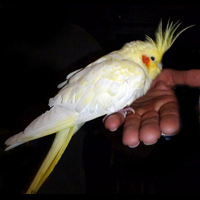
Fluffy and Tired:
This bird was found outside on the ground in a parking lot.
She was tired and just wanted to sleep so we let her rest.
She never woke up.
This was my first experience with bird sickness and death.
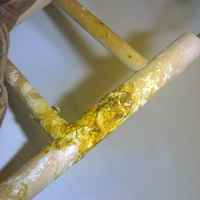
Sick Birds:
Birds are unique because they don't show symptoms of being sick until they are near death because if they do, predators will prey on them. We have to pay close attention because their symptoms are so subtle. If they have lost weight, they will fluff up their feathers to look bigger than they are. They don't have a lot of energy so tend to be tired and sleepy. If your bird is not acting like their usual self, they are probably sick.
If you have birds, you should have a small weigh scale and weigh them from time to time and record it so you have their normal weight. If they seem a little off, weigh them and check with the internet what a normal weight should be for your bird. If they drop 10% of their normal body weight, their chances of survival diminish.
Other symptoms of sickness:
* Abnormal Droppings * Less talkative * Out of character * Cold Feet
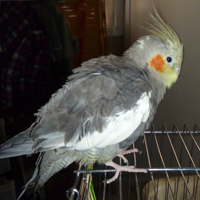
"Fluffy and Tired"
...means get to the vet RIGHT AWAY as they may not make it til tomorrow. If they are too tired to sit on a perch and are on the bottom of their cage, they are near the end. If you've found a bird on the ground, they are at this point and need to go immediately to an Avian Veterinarian.This particular bird was taken to the vet as soon as it was noted he was fluffy, tired and quiet (he was usually flying around and whistling). His poop was examined under a microscope and he was diagnosed with a bacterial infection. The vet gave him antibiotics (Enrofloxacin) and said he had a 50-50 chance of making it through the night.
He was feeling much better the next day and continued the antibiotics for the rest of the 10 days.
Note: This cockatiel was only 2 mths old which is why he looks like a female in the photo
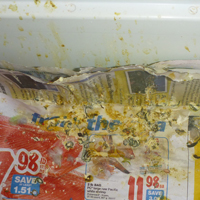
Yellow Poop = Bacterial Infection
This is what his poop looked like. Note the really bright yellow. See also the above photo of the ladder.
For those in London, Ontario, Hamilton Road Animal Hospital is open late. See their facebook page for hours.
I also have extra Antibiotics in my fridge in case of night emergency. Call 519-858-9755 or text 519-476-2382 and and call if no answer to text.
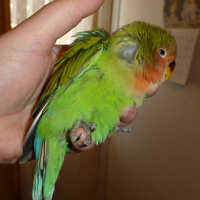
Fluffy and Tired:
This bird was noticed to be fluffy and tired. When picked up, the feathers stayed where they put (notice the thumbprint on the side of the face). Thinking it may be a bacterial infection, the poop was checked. It was black.
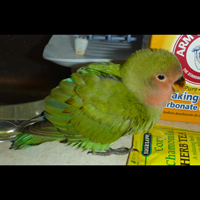
Black Poop:
Black poop is a sign of not eating.
In this case, it was a baby lovebird that was just bought from a breeder. It was assumed it was already weaned, but wasn't eating on its own. Baby bird formula was mixed and fed to the bird every 3-4 hrs until she was eating on her own. You can buy baby bird formula at most pet stores. She perked up soon after the first feeding. If that hadn't happened, she would've been taken to the vet.
In other cases, the bird needs to go to the vet to find out why it's not eating. It could have an infection, blockage or something more serious.

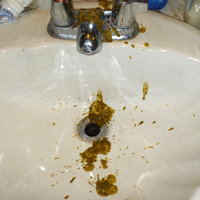
Gross Smelly Runny Poop
If the poop looks like this or smells bad, it may be a big problem
...unless your bird is sitting on eggs all day. Birds that stay in the nest only come out once a day to poop.
This poop belongs to a cockatiel that was sitting on eggs. When she isn't on eggs, her poop is normal again.
There are also some birds that don't like to poop in their cage, and it will be similar. The second poop of the day should be back to normal.
If not, see a vet ASAP.
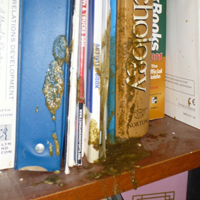
If you do have a bird on eggs, make sure you don't open the cage door without taking her to a place to use the washroom. Otherwise you may have cleaning up to do.
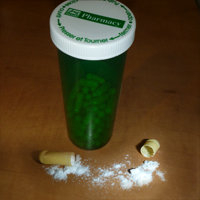
Poisoned!
What do you do when you realize your birds just broke open one of your pills?
Contact the Pet Poison Helpline. They have 24/7 help and can look up the medication just swallowed for any pet. There is a charge for the service, but it's well worth it.
In this situation, the pill the cockatiels were playing with they could be prescribed, but their dose would be only 1/300 of the amount in this pill. I was told to go to a drug store and get "Activated Charcoal" and give them a half a pill each every 8 hrs. I guess it's used for human consumption as well for food poisonings etc so it's a good to have on hand in case of an emergency. It has no real taste but is very chalky so best to mix with orange juice or water. They will also be very thirsty after so provide lots of water.
The cockatiels were fine and never showed any symptoms. Had I waited until they showed symptoms, it would most likely be too late for the Charcoal to work.
Note: I now know why they looked so proud holding the half-capsule. They are actually hard to break open! (it took me a while to break it for the photo)
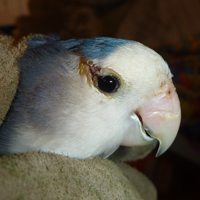
Infections
Birds can get hurt. If the wound doesn't heal properly, you may see yellow pus and the wound may be raised as well. The bird may need to be on antibiotics for a week.
This lovebird was in a fight with another lovebird and they go for the beaks and eyes when they fight.
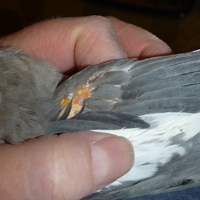
This bird has an infection on its wing. There is yellow and the wound is swollen.
Both birds were put on antibiotics and healed fine.
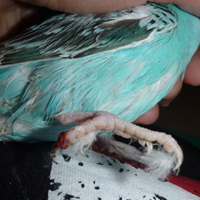
Bleeding
Sometimes birds get hurt and are bleeding. For small bleeds like trimming nails, you can use Vaseline.
On bigger wounds, you may have to use a mixture of corn starch and water as well as pressure. I have held budgies' feet for 5 hrs with corn starch and the bleeding still doesn't stop.

I tried a few different things from the vet, but the best thing I found is called Clay-Cal. It's Calcium-enriched clay and is totally harmless and actually good for the birds if they eat it. Just mix it with a little water and apply it on the wound like a cast. It doesn't take long to stop the bleeding, but I usually hold the bird to stop them from picking it off too soon.
In the wild the bleeding bird will go to a mud puddle and sit in it until the bleeding stops. The Clay-Cal is very much like this.
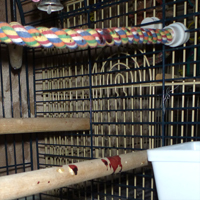
For a lot of blood loss, the bird should see a vet as soon as possible. When I came home to find blood all over my cockatiel's cage, stopping the bleeding wasn't enough. I took her to the vet the next morning and they gave her a shot of stuff to hydrate her and help with the blood loss. Luckily birds actually produce blood much faster than we do.
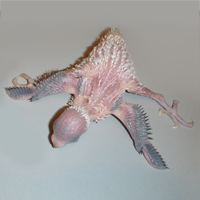
Splayed Legs
When babies are in the nest, sometimes they have splayed legs. It's an easy fix when they're still young. If you don't fix it, they won't be able to perch, stand or walk.
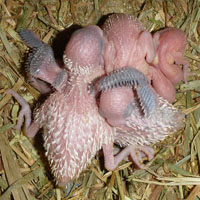
It happens usually with the babies that are on the top of the pile.
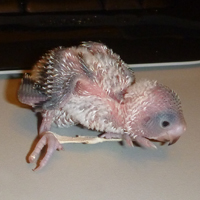
Take medical tape and tape it from one foot to the other foot. Make sure it's on the foot part and not the toes or legs, and it's evenly spaced. Once I figured out what I was doing, I re-did to get the tape on the feet parallel to each other.
Just after putting the tape on, the birds were standing and walking! And one was dancing! See video
I left it on for 8 days and was really glad I used medical tape because I don't think anything else would've come off as easily at that point.